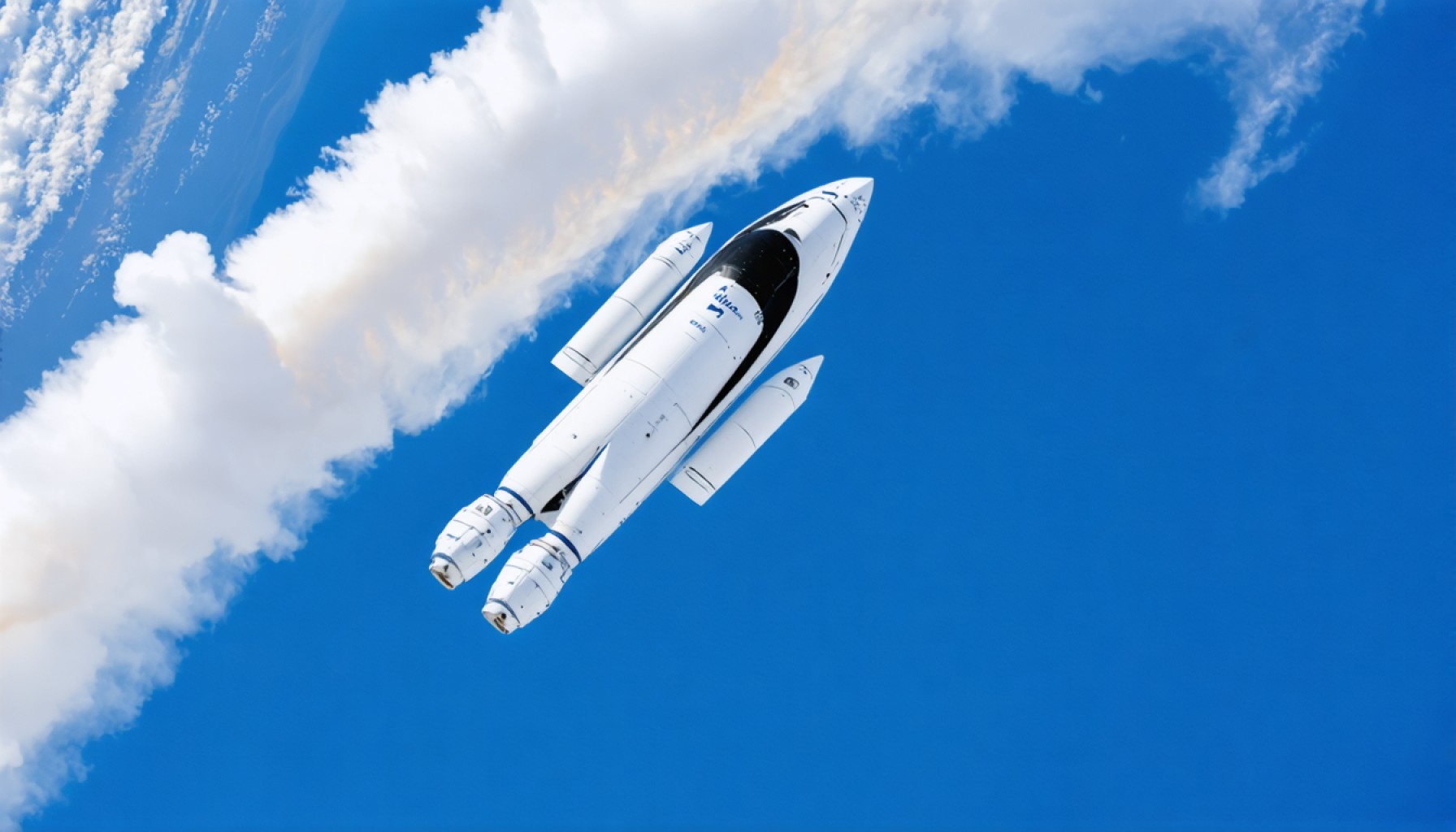- Blue Origin’s all-female mission features six diverse women, echoing historic space milestones like Valentina Tereshkova’s first female spaceflight.
- The crew includes notable figures such as Katy Perry, Gayle King, Aisha Bowe, Amanda Nguyen, Lauren Sanchez, and Kerianne Flynn.
- The mission highlights the intersection of privilege and opportunity, questioning the genuine accessibility of space travel for all.
- Historically, women like Catherine Coleman and Mae Carol Jemison have faced systemic barriers, underscoring the challenges women face in space exploration.
- Eileen Collins’ experience as the first female space shuttle commander illustrates the pressure of breaking new ground.
- The mission contrasts broad gender equality aspirations, challenging the notion that progress in space should align with fame and celebrity.
- The overarching lesson promotes accessibility and inclusivity in space for all, beyond notable and privileged figures.
As spring approaches, the sky isn’t the limit for the latest team embarking on an unprecedented space mission. Blue Origin has assembled an all-female crew, set to break the stratosphere and stereotypes alike, marking a milestone reminiscent of the past—all eyes remember Valentina Tereshkova’s solitary spaceflight sixty years ago. This time, however, six women of diverse backgrounds are poised to write a new chapter in celestial history.
In a line-up that reads like a dazzling who’s who, the spaceflight boasts pop star Katy Perry, media heavyweight Gayle King, and pioneering minds like former NASA scientist Aisha Bowe. Accompanying them are civil rights crusader Amanda Nguyen, journalist Lauren Sanchez, and Hollywood producer Kerianne Flynn. Together, they form a mosaic of aspiration and ambition, each story distinct yet interweaving in a tapestry of progress.
Yet, beneath the polished veneer of ambition lies an intricate narrative. This mission, while inspirational, illuminates the intersection of privilege and achievement. For Katy Perry, the adventure is a literal and metaphorical flight encouraging her children and future generations to “reach for the stars.” But beyond the media spectacle and motivational slogans, the underlying reality is more complex. It poses inquiries about genuine accessibility to such high-flying dreams.
The story bears similarities to the chronicles of pioneering women astronauts. Figures like Catherine Coleman have shared the silent battles fought in spacesuits designed with no consideration for female astronauts. Her memoirs sketch a landscape of resilience against the odds, suggesting that to soar among the stars, she needed to transcend barriers both tangible and systemic.
This isn’t alien territory for other iconic spacefarers either. Mae Carol Jemison, the first African-American woman in space, reflected in her autobiography about a sense of destined belonging to the cosmos. Yet, these accounts, while full of inspiration, hint at the rarified air in which such women operate—a realm not universally accessible.
The tales of Eileen Collins, who shattered glass ceilings as the first woman to pilot and command a space shuttle, echo this sentiment. Her experiences underline the weight of being the “first” and the unyielding scrutiny it brings. Her words vividly showcase the intense pressure to perform perfectly in a sky governed largely by men.
As the narrative of Blue Origin’s flight unfolds, it mirrors—but also contrasts with—these historic narratives. While the mission is framed as a beacon of feminine progress, it doesn’t reflect the everyday woman’s experience. Instead, the mission highlights how fame and privilege often dovetail with such extraordinary opportunities.
The challenge lies not just in championing women in space but in dismantling the myth that achieving such milestones must inherently align with notoriety. If this mission, with its star-studded roster and high-stakes aspirations, is to serve as a guiding light in the galaxy of gender equality, it must also acknowledge the discrepancies between opportunity and accessibility.
As we look towards the stars and the impending launch, it’s not just a journey into space we’re witnessing, but into the ethos of aspiration itself—a chance to rethink the narrative that dreams and reality are the sole domain of the already exceptional. The lesson is clear: progress in space should illuminate pathways for all, not just those already in the limelight.
Trailblazing to the Stars: Blue Origin’s All-Female Space Mission and Its Implications
Introduction
Blue Origin’s announcement of an all-female crew for its upcoming space mission marks a significant milestone in gender representation in space exploration. Featuring a lineup that includes pop star Katy Perry, media icon Gayle King, former NASA scientist Aisha Bowe, civil rights advocate Amanda Nguyen, journalist Lauren Sanchez, and Hollywood producer Kerianne Flynn, the mission is set to inspire future generations. Yet, it also opens discussions about privilege, accessibility, and the real challenges women face in the field of space travel.
Pressing Questions and Insights
How Were the Crew Members Selected?
The selection of crew members for Blue Origin’s mission involves a combination of their achievements, public influence, and potential to inspire. Although not all members have a background in space science, their varied professional journeys showcase diverse pathways to contribute to space exploration. This highlights an ongoing debate on whether such missions should prioritize individuals with specific expertise or those who can generate public interest and inspire the next generation.
How Does This Mission Compare to Historical Female Spaceflights?
Much like Valentina Tereshkova’s groundbreaking solo mission in 1963, Blue Origin’s diverse crew reflects a broader, more inclusive vision of space exploration. Mae Jemison and Eileen Collins were pivotal figures who blazed trails despite early systemic barriers, paving the way for today’s expanded inclusivity. However, the privilege associated with Blue Origin’s crew raises questions about a universal representation in space.
What Are the Implications for Diversity and Accessibility in Space?
The presence of influential personalities in this mission suggests strides towards diversity but also unearths the issues of accessibility. As space travel becomes more commercial, efforts must focus on making these opportunities attainable for a wider demographic beyond the affluent or well-connected.
Real-World Use Cases for Space Missions
– Inspiration for STEM Education: High-profile space missions can captivate and motivate younger audiences to pursue STEM fields, offering role models who challenge gender norms.
– Commercial Space Tourism: Highlighting the accessibility of space travel for non-astronauts, these missions can advance the space tourism industry, ultimately driving technological and infrastructural progress.
– Technological Advancements: Increased missions spearheaded by diverse teams often lead to innovative solutions and technology applications in sectors beyond aerospace.
Market Forecasts and Industry Trends
The space tourism industry is projected to experience significant growth. According to UBS, it could become a $3 billion market by 2030. Companies like Blue Origin and SpaceX lead these efforts, with mission diversity likely influencing future policies and public engagement strategies.
Controversies and Limitations
The juxtaposition of fame and opportunity in space missions can overshadow underlying disparities. While progress is notable, real change requires systemic support to foster talent from underrepresented and economically diverse backgrounds.
Recommendations for Future Space Endeavors
– Expand Accessibility: Organizations should invest in scholarship programs for training and education in aerospace, making dreams of space travel feasible for a broader demographic.
– Promote Diverse Pathways: Highlight diverse career paths within the industry, encouraging different educational backgrounds to consider entering the sector.
– Foster International Collaboration: Work globally to ensure shared knowledge and resources, thus broadening the scope and impact of future missions.
Conclusion
Blue Origin’s all-female crew opens an exciting chapter in space exploration, challenging existing paradigms. While celebrating this milestone is crucial, it also highlights the need for tangible pathways to ensure space is truly the “final frontier” accessible to all. As we anticipate this mission, let’s take actionable steps toward inclusivity, making sure the journey into the cosmos is one that everyone can dream of embarking upon.
For more insights, visit Blue Origin.











